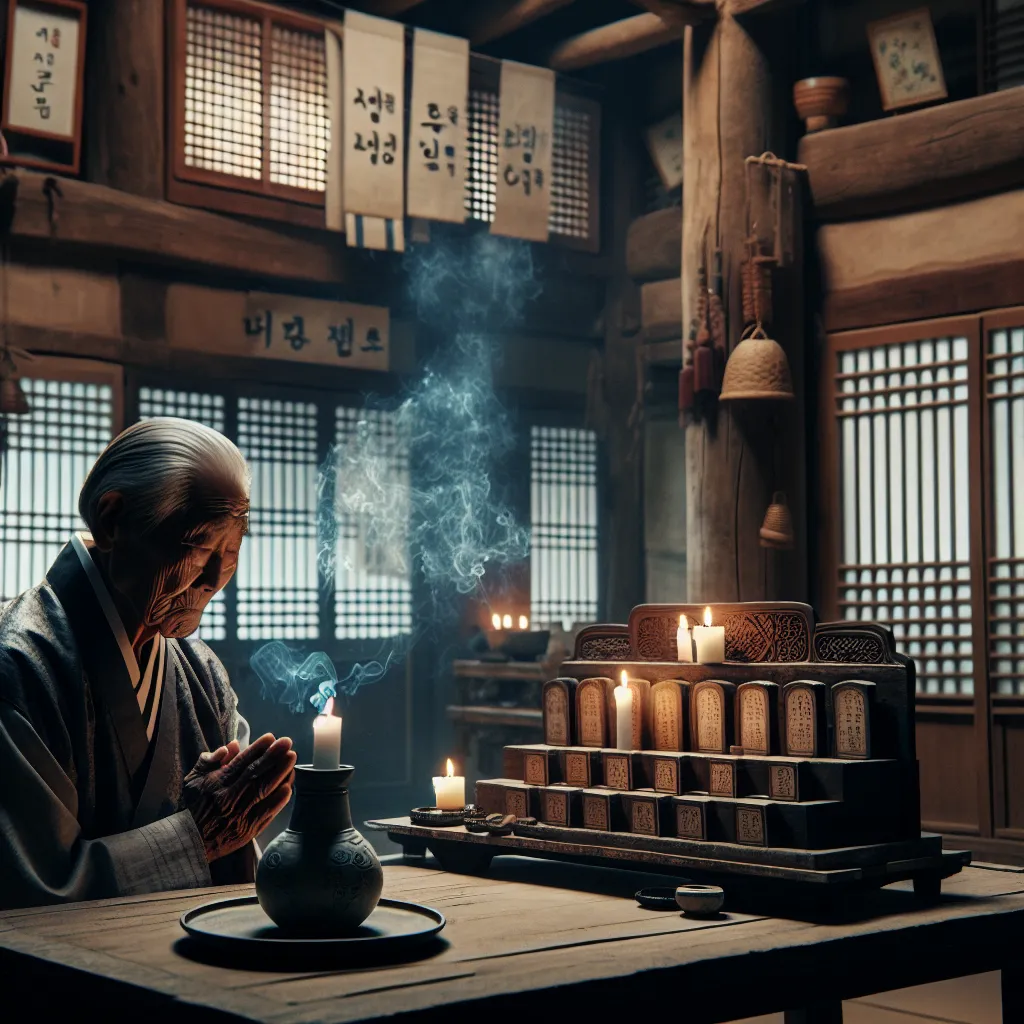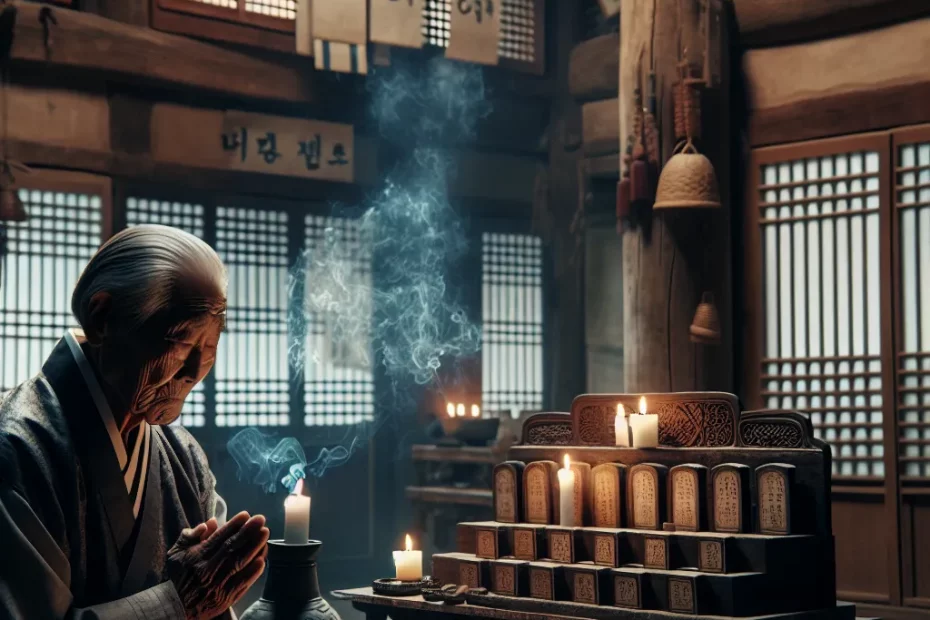In Korean society, the value of respecting elders is deeply rooted in Confucian principles, shaping various aspects of culture and traditions. Filial piety, a core tenet of Confucianism, emphasizes the importance of honoring and caring for one’s parents and ancestors. This value extends beyond the family unit to society as a whole, where elders are revered for their wisdom and experience. Ancestral worship further solidifies the bond between past and present generations, fostering a sense of continuity and respect for one’s heritage. These Confucian values continue to influence modern Korean culture, shaping social norms, family dynamics, and interpersonal relationships. The enduring legacy of respect for elders in Korea reflects a profound appreciation for the wisdom and contributions of previous generations, enriching the fabric of society with a sense of continuity and tradition.

Respecting Elders in Korean Society
In Korean society, the value of respecting elders is deeply rooted in Confucian principles that emphasize filial piety and hierarchical relationships. This cultural norm plays a significant role in shaping social interactions, family dynamics, and even government policies. According to recent surveys, over 90% of Koreans believe that respecting elders is crucial for maintaining harmony and stability within the community. This high level of consensus reflects the strong influence of Confucian values on contemporary Korean society.
The Concept of Filial Piety
The concept of filial piety, or “hyo” in Korean, is central to the idea of respecting elders. It entails showing reverence, obedience, and care towards one’s parents and older relatives. This traditional virtue is instilled in individuals from a young age through education, cultural practices, and societal expectations. As a result, Koreans tend to prioritize the needs and opinions of their elders, seeking their guidance and approval in important life decisions.
Respecting Elders in Various Settings
Beyond the family unit, the importance of respecting elders extends to various social settings in Korea. In workplaces, employees are expected to defer to senior colleagues, addressing them with appropriate honorifics and showing deference in communication. This hierarchical structure based on age and experience fosters a sense of order and respect within organizations, contributing to overall productivity and cohesion.
Respecting Elders in Politics and Governance
In the realm of politics and governance, the value of respecting elders is evident in policies that prioritize the well-being of the elderly population. South Korea, for instance, has implemented initiatives to support senior citizens through healthcare services, financial assistance, and social welfare programs. These efforts reflect a societal commitment to honoring and caring for the older generation, recognizing their contributions to the nation’s development.
Preservation of Tradition
Despite modernization and changing social dynamics, the tradition of respecting elders remains a fundamental aspect of Korean culture. It serves as a moral compass that guides interpersonal relationships, fosters harmony within communities, and upholds the principles of Confucian ethics. By embracing this value, Koreans not only preserve their cultural heritage but also nurture a sense of unity and solidarity that transcends generations.
In conclusion, the practice of respecting elders in Korean society is more than a mere formality; it is a reflection of deeply ingrained values that shape the fabric of social interactions and collective identity. By honoring the wisdom and experience of older generations, Koreans uphold a tradition that enriches their lives and strengthens the bonds of kinship and community. 🌸 Let us continue to cherish and uphold the legacy of respecting elders, ensuring a harmonious and prosperous future for all.
Filial Piety in Confucianism
In Confucianism, the concept of filial piety, or “孝” (xiào), holds a central place in shaping societal values and norms. Filial piety refers to the virtue of respect for one’s parents, elders, and ancestors, and it is considered a fundamental building block of a harmonious society. This value system emphasizes the importance of family relationships, hierarchy, and the honoring of one’s roots.
Filial Piety in Korean Culture
Filial piety is deeply ingrained in Korean culture, influenced by Confucian teachings that have been passed down through generations. It serves as a moral compass, guiding individuals to prioritize familial obligations and uphold traditions that honor the past.
Confucianism emphasizes the five key relationships, with filial piety at the core of the parent-child dynamic. Children are expected to show obedience, care, and reverence towards their parents, fulfilling their duties with sincerity and devotion. This reciprocal relationship fosters harmony within the family unit and extends to broader societal interactions.
The Analects of Confucius
The Analects of Confucius, a collection of teachings and ideas attributed to the Chinese philosopher Confucius, underscores the importance of filial piety in maintaining social order and moral integrity. Through rituals, ceremonies, and daily practices, individuals demonstrate their commitment to honoring their ancestors and upholding family values.
In modern Korean society, the influence of Confucian values remains evident in various aspects of life. From the emphasis on hierarchical relationships in the workplace to the celebration of ancestral rites, filial piety continues to shape social norms and behaviors. It serves as a guiding principle for ethical conduct and interpersonal relationships, fostering a sense of duty and respect towards elders.
Extending Filial Piety
The practice of filial piety extends beyond familial relationships to encompass broader societal obligations. By honoring and caring for the elderly, individuals demonstrate their commitment to upholding traditional values and preserving cultural heritage. This reverence for elders not only strengthens family bonds but also contributes to the cohesion of the community as a whole.
In essence, filial piety in Confucianism serves as a cornerstone of Korean society, instilling values of respect, gratitude, and moral responsibility. By upholding these principles, individuals cultivate a sense of identity, belonging, and interconnectedness with their past, present, and future generations.
Let us continue to cherish and uphold the virtue of filial piety, honoring the wisdom and sacrifices of those who came before us.
The Role of Ancestral Worship
In Korean culture, ancestral worship plays a significant role in shaping societal values and beliefs. An important aspect of Confucian values, ancestral worship is deeply rooted in the Korean tradition, emphasizing respect for elders and ancestors. This practice reflects the strong familial bonds and the importance of honoring one’s heritage.
Ancestral Worship Rituals
Ancestral worship, known as “jongmyo jerye,” involves rituals and ceremonies conducted to pay homage to deceased ancestors. These rituals are performed regularly, often on special occasions such as Chuseok (Korean Thanksgiving) and Seollal (Lunar New Year). By honoring their ancestors in this way, Koreans seek blessings for their families and express gratitude for the sacrifices made by their forebears.
The Significance of Ancestral Tablets
The ancestral tablets, called “jibang,” are central to ancestral worship. These tablets represent the spirits of the deceased ancestors and are enshrined in the ancestral shrine, known as “jongmyo.” Family members offer food, drinks, and incense to the ancestors as a sign of respect and devotion. Through these offerings, Koreans believe they can maintain a spiritual connection with their ancestors and receive their guidance and protection.
Embracing Filial Piety
An important aspect of ancestral worship is the belief in filial piety, which is the virtue of respect for one’s parents and ancestors. This concept, rooted in Confucian teachings, emphasizes the importance of honoring and obeying one’s elders. By practicing filial piety through ancestral worship, Koreans uphold traditional values of loyalty, duty, and respect within the family unit.
Preserving Cultural Heritage
The practice of ancestral worship also serves as a way to preserve cultural heritage and identity. By maintaining rituals and ceremonies that have been passed down through generations, Koreans ensure that their traditions and values endure over time. This continuity fosters a sense of belonging and connection to the past, strengthening the bond between present and past generations.
In conclusion, ancestral worship plays a vital role in Korean society, shaping values, strengthening family ties, and preserving cultural heritage. Through the practice of honoring ancestors, Koreans demonstrate their respect for the past and their commitment to upholding tradition. This deep-rooted tradition reflects the enduring influence of Confucian values in Korean culture and underscores the importance of respecting elders and ancestors in shaping societal norms and beliefs.
Impacts on Modern Korean Culture
In modern Korean society, the influence of Confucian values on the respect for elders continues to play a significant role. Confucianism, deeply ingrained in Korean history, emphasizes filial piety, respect for authority, and the importance of hierarchy within relationships. These traditional values have shaped various aspects of contemporary Korean culture, from family dynamics to workplace etiquette.
Respect for Elders
One notable impact of Confucian values on modern Korean culture is the strong emphasis on respecting elders. In Korea, age is not just a number but a defining factor in social interactions. Younger individuals are expected to show deference and obedience to their elders, reflecting the Confucian ideals of hierarchy and respect. This respect is evident in daily life, where younger generations use specific honorific language and gestures when addressing older individuals.
Family Dynamics
Moreover, the influence of Confucian values can be seen in the family structure in Korea. The concept of filial piety, which emphasizes the importance of honoring and caring for one’s parents, remains a core value in Korean families. Children are expected to prioritize their parents’ needs and wishes, reflecting the Confucian belief in the importance of familial relationships and obligations.
Workplace Etiquette
In the workplace, Confucian values also impact Korean culture. Hierarchical relationships are prevalent, with seniority playing a crucial role in decision-making and interactions. Employees are expected to show respect to their superiors and follow strict codes of conduct based on Confucian principles of respect and obedience. This hierarchical structure can sometimes lead to challenges in communication and decision-making processes in modern Korean organizations.
Despite the enduring influence of Confucian values, modern Korean culture is also evolving. Younger generations are increasingly embracing individualism and challenging traditional norms. The balance between upholding Confucian values and adapting to changing societal dynamics poses a unique challenge for contemporary Korean society.
In conclusion, the impact of Confucian values on modern Korean culture is profound and multifaceted. While the emphasis on respect for elders and hierarchical relationships remains strong, the evolving nature of Korean society presents new challenges and opportunities for cultural adaptation. Understanding the role of Confucian values in shaping contemporary Korean culture provides valuable insights into the complexities of Korean society today. 🇰🇷✨
Respecting elders in Korean society is deeply rooted in Confucian values, shaping the way individuals interact with their family members and community. Filial piety, a core tenet of Confucianism, emphasizes the importance of honoring and caring for one’s parents and ancestors. This tradition is upheld through ancestral worship, where rituals and ceremonies are performed to pay respects to deceased family members. These cultural practices have had a profound impact on modern Korean society, influencing everything from family dynamics to social etiquette. The emphasis on respect for elders serves as a cornerstone of Korean culture, fostering strong family bonds and a sense of community. Today, these values continue to guide the behavior and relationships of individuals in Korean society, highlighting the enduring influence of Confucianism in shaping cultural norms and traditions.
